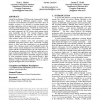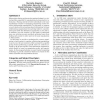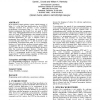26 search results - page 3 / 6 » Cache leakage control mechanism for hard real-time systems |
109
click to vote
JSA
2000
14 years 11 months ago
2000
In this article, the problem of finding a tight estimate on the worst-case execution time (WCET) of a real-time program is addressed. The analysis is focused on straight-line code...
IISWC
2006
IEEE
15 years 5 months ago
2006
IEEE
— As CMPs are emerging as the dominant architecture for a wide range of platforms (from embedded systems and game consoles, to PCs, and to servers) the need to manage on-chip res...
106
click to vote
ISCA
2007
IEEE
15 years 6 months ago
2007
IEEE
Virtual Private Machines (VPM) provide a framework for Quality of Service (QoS) in CMP-based computer systems. VPMs incorporate microarchitecture mechanisms that allow shares of h...
ACMICEC
2008
ACM
15 years 1 months ago
2008
ACM
Information sharing and protection against leakage is a critical problem especially for organisations having sensitive information. Sharing content between individuals in the same...
OOPSLA
2004
Springer
15 years 5 months ago
2004
Springer
In the domain of hard real-time systems, which language is better: C++ or the Real-Time Specification for Java (RTSJ)? Although standard Java provides a more productive programmin...



